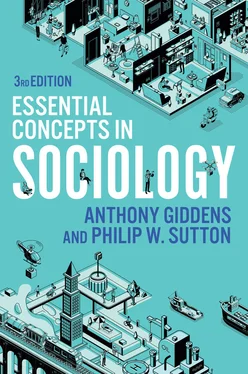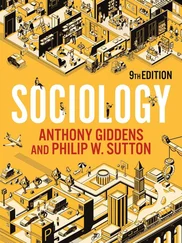208 206
209 207
210 208
211 209
212 210
213 211
214 212
215 213
216 214
217 215
218 216
219 217
220 218
221 219
222 220
223 221
224 222
225 223
226 224
227 225
228 226
229 227
230 228
231 229
232 230
233 231
234 232
235 233
236 234
237 235
238 236
239 237
240 238
241 239
242 240
243 241
244 242
Essential Concepts in Sociology
Third Edition
ANTHONY GIDDENS & PHILIP W. SUTTON
polity
Copyright © Anthony Giddens & Philip W. Sutton 2021
The right of Anthony Giddens & Philip W. Sutton to be identified as Author of this Work has been asserted in accordance with the UK Copyright, Designs and Patents Act 1988.
First edition published in 2014 by Polity Press
This third edition first published in 2021 by Polity Press
Polity Press
65 Bridge Street
Cambridge CB2 1UR, UK
Polity Press
101 Station Landing
Suite 300
Medford, MA 02155, USA
All rights reserved. Except for the quotation of short passages for the purpose of criticism and review, no part of this publication may be reproduced, stored in a retrieval system or transmitted, in any form or by any means, electronic, mechanical, photocopying, recording or otherwise, without the prior permission of the publisher.
ISBN-13: 13: 978-1-5095-4809-5
A catalogue record for this book is available from the British Library.
Library of Congress Cataloging-in-Publication Data
Names: Giddens, Anthony, author. | Sutton, Philip W., author.
Title: Essential concepts in sociology / Anthony Giddens & Philip W. Sutton.
Description: Third Edition. | Medford : Polity Press, 2021. | Revised edition of the author’s Essential concepts in sociology, 2017. | Includes bibliographical references and index. | Summary: “Succinct guide to the core ideas that shape our understanding of the social world”-- Provided by publisher.
Identifiers: LCCN 2021000856 (print) | LCCN 2021000857 (ebook) | ISBN 9781509548088 (hardback) | ISBN 9781509548095 (paperback) | ISBN 9781509548101 (epub)
Subjects: LCSH: Sociology.
Classification: LCC HM585 .G51973 2021(print) | LCC HM585(ebook) | DDC 301--dc23
LC record available at https://lccn.loc.gov/2021000856LC ebook record available at https://lccn.loc.gov/2021000857
The publisher has used its best endeavours to ensure that the URLs for external websites referred to in this book are correct and active at the time of going to press. However, the publisher has no responsibility for the websites and can make no guarantee that a site will remain live or that the content is or will remain appropriate.
Every effort has been made to trace all copyright holders, but if any have been overlooked the publisher will be pleased to include any necessary credits in any subsequent reprint or edition.
For further information on Polity, visit our website:
politybooks.com
Sociology has its origin in the nineteenth century, but it is a discipline that must move and change with the times or risk becoming irrelevant. This is because our object of study, the social life we all live and make together, is itself in a continuous process of change. Conflicts and wars, new patterns of migration, multiculturalism, increasingly fluid gender relations, a digital revolution in communications, financial crises, global health pandemics and terrorism are just some of the phenomena that sociologists investigate and seek to understand. Given this diverse range of subjects, it is not surprising that sociology is theoretically diverse and uses a broad array of research methods to help us make sense of the human world. This is the inevitable outcome of attempts to understand and explain our globalizing world, but it also follows that our familiar and comfortable concepts always need to be reassessed and new ones created where necessary. This book includes what we think is a productive mixture of both long-established and more recent concepts.
Concept Development in Sociology
Some sociological concepts are part of the very tissue of the discipline, having weathered the shifting terrain of society pretty well. Social class, status, capitalism, gender, poverty, family and power remain fundamental to anyone interested in ‘doing’ sociology. Yet others are more recently developed and are still debated and argued over. Globalization, postmodernity, reflexivity, postcolonialism, environment, and the social model of disability are part of the conceptual lexicon, representing some of the major social changes of recent decades. The book provides a map of sociology’s conceptual development and current condition by introducing the essential concepts, many of which are effective signposts for particular theoretical developments since the late nineteenth century. Familiarizing themselves with these concepts, their origins and contemporary usage will help readers to see how the subject matter of sociology has developed over time.
Concept development in sociology is usually linked to theories and empirical studies, both of which often demand new concepts to make sense of their findings. Some concepts, such as status, class and risk, are already in circulation in society, but when lifted out of that context into sociology they are debated and refined, becoming more precise and useful in the process. Others, including alienation, moral panic and globalization, have been created by sociologists to orientate and help them to study social phenomena, after which they can ‘slip’ into everyday life, where they may influence or change people’s perceptions of the world in which they live. This is quite unlike the situation in the natural sciences. Regardless of how many concepts from the natural sciences are created, those concepts do not have the potential to change the behaviour of animals and plants. As Giddens has argued, this is an example of a ‘one-way’ process. In sociology, concepts, research findings and theories do make their way back into society and people may alter their ideas and behaviour as a result. This means that sociological research is part of a continuous ‘two-way’ process between sociologists and the subjects they study.
This two-way process means that our concepts are inherently unstable and open to modification and change, not just within professional sociological discourse but in the social world itself. It also means that some concepts – perhaps even a majority – are ‘essentially contested’. That is, they are used in a variety of theories in different ways. This perhaps overstates the level of variation and disagreement, though because, in practice, competing theories in sociology are relatively few and there is more consistency and integration between them than might first appear.
Concepts developed within one theoretical perspective are very often used in others. The concept of alienation, for instance, was devised by Karl Marx, enabling him to understand better the nature of work in capitalist societies. Yet it was revived more than a century later, lifted out of its original Marxist theoretical frame and given a new lease of life by industrial sociologists trying to understand how employees in different sectors felt about work and their working environment. In the process, the concept was modified and, though some Marxists may object, the revised version gave us some worthwhile insights into how different workplaces and management systems impact on the lives of workers.
For this new edition we have updated all of the entries and added two more: postcolonialismand the digital revolution. These latter two have become very widely used across numerous fields of study and look set to become firmly established in sociology, hence they deserve a place in the book. A reminder at the outset that this is not, and is not intended to be, a comprehensive compendium of all sociological concepts. We have selected concepts that have helped to shape, or are currently shaping, the varied fields that make up sociology. The concepts can be roughly divided into three types. First, those very longstanding concepts – power, ideology, society, culture – that have been in use for most or much of the history of sociology, but that still stimulate debate and guide research projects. Second are those – gender, consumerism, identity – that do not have such a long history but have made a significant impact on the discipline, stimulating large bodies of research and reframing older debates, forcing sociologists to reassess their earlier ideas. Third, we have included some more recent concepts – intersectionality, globalization, digital revolution – as these have already generated many innovative and important research studies which have led sociologists in new directions.
Читать дальше












